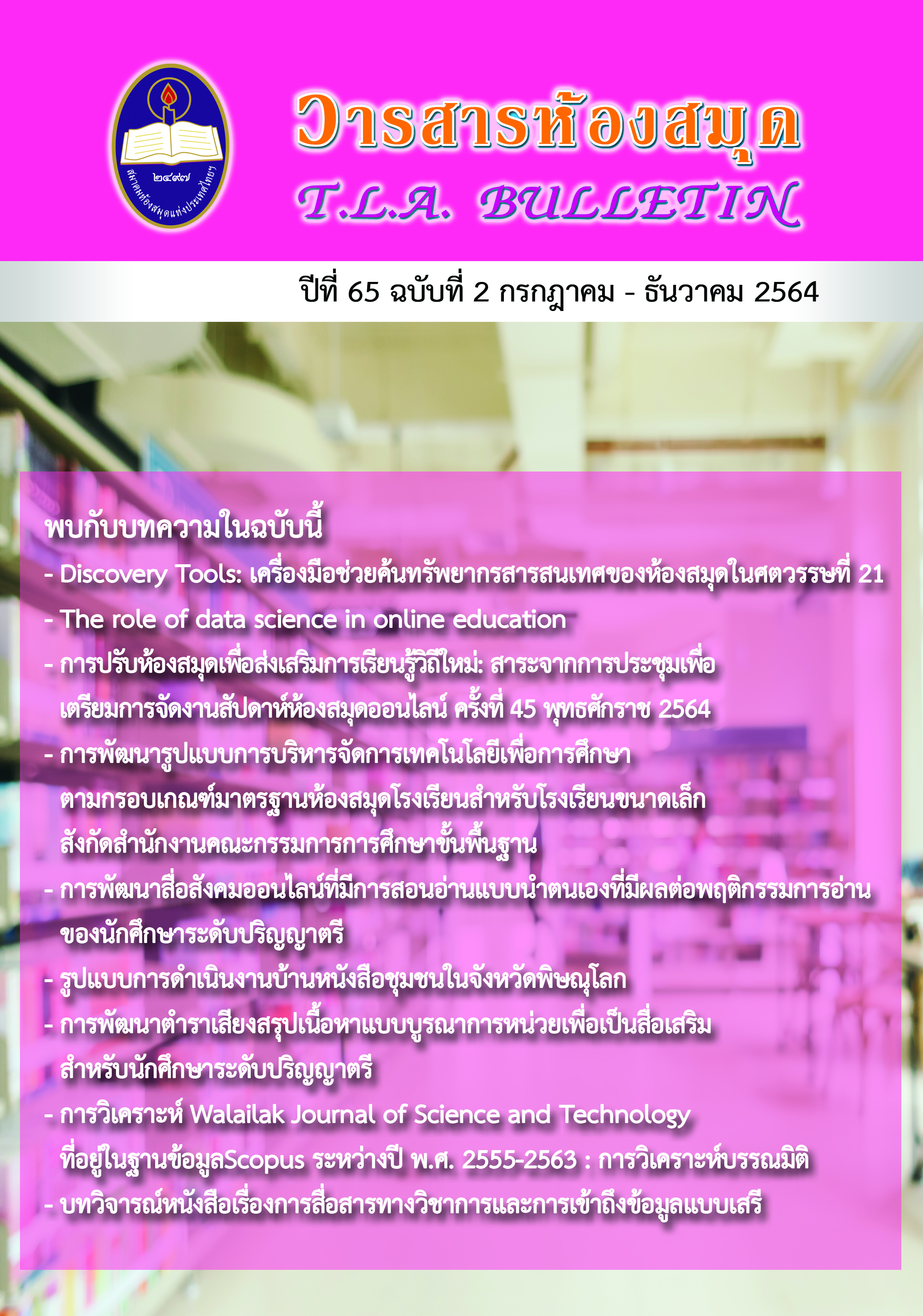การพัฒนาสื่อสังคมออนไลน์ที่มีการสอนอ่านแบบนำตนเองที่มีผลต่อพฤติกรรมการอ่านของนักศึกษาระดับปริญญาตรี
คำสำคัญ:
สื่อสังคมออนไลน์, การสอนอ่านแบบนำตนเอง, พฤติกรรมการอ่านบทคัดย่อ
การวิจัยนี้มีวัตถุประสงค์เพื่อ 1) พัฒนาสื่อสังคมออนไลน์ที่มีการสอนอ่านแบบนำตนเองที่มีผลต่อพฤติกรรมการอ่านของนักศึกษาระดับปริญญาตรีที่มีประสิทธิภาพ 2) เปรียบเทียบพฤติกรรมการอ่านของนักศึกษาก่อนเรียนและหลังเรียนด้วยสื่อสังคมออนไลน์ที่มีการสอนอ่านแบบนำตนเอง 3) ศึกษาผลสัมฤทธิ์ทางการเรียนของนักศึกษาก่อนเรียนและหลังเรียนด้วยสื่อสังคมออนไลน์ที่มีการสอนอ่านแบบนำตนเอง และ 4) ศึกษาความพึงพอใจของนักศึกษาที่มีต่อสื่อสังคมออนไลน์ที่มีการสอนอ่านแบบนำตนเอง กลุ่มตัวอย่าง ได้แก่ นักศึกษาระดับปริญญาตรีชั้นปีที่ 1 คณะครุศาสตร์อุตสาหกรรม สาขาเทคโนโลยีและสื่อสารการศึกษา มหาวิทยาลัยเทคโนโลยีราชมงคลธัญบุรี ที่ลงทะเบียนเรียนวิชา ชุดการสอน ภาคเรียนที่ 1 ปีการศึกษา 2559 จำนวน 30 คน ซึ่งได้มาโดยการเลือกแบบเจาะจง เครื่องมือที่ใช้ในการวิจัย ประกอบด้วย สื่อสังคมออนไลน์ที่มีการสอนอ่านแบบนำตนเอง แบบประเมินคุณภาพของสื่อสังคมออนไลน์ที่มีการสอนอ่านแบบนำตนเอง แบบวัดผลสัมฤทธิ์ทางการเรียน แบบวัดพฤติกรรมการอ่าน และแบบประเมินความพึงพอใจ สถิติที่ใช้ในการวิเคราะห์ข้อมูลประกอบด้วย ค่าเฉลี่ย ส่วนเบี่ยงเบนมาตรฐาน และการทดสอบค่าทีของกลุ่มตัวอย่างที่ไม่เป็นอิสระจากกัน ผลการวิจัย พบว่า 1) สื่อสังคมออนไลน์ที่มีการสอนอ่านแบบนำตนเอง มีประสิทธิภาพตามเกณฑ์ 80/80 กล่าวคือ E1/ E2 มีค่าเท่ากับ 80.25/81.44 มีประสิทธิภาพตามเกณฑ์ที่ตั้งไว้ 2) นักศึกษามีพฤติกรรมการอ่านหลังเรียนด้วยสื่อสังคมออนไลน์ที่มีการสอนอ่านแบบนำตนเอง สูงกว่าก่อนเรียนอยู่ในระดับมาก มีค่าเฉลี่ยเท่ากับ 3.70 3) นักศึกษามีสัมฤทธิ์ทางการเรียนหลังเรียนสูงกว่าก่อนเรียน อย่างมีนัยสำคัญทางสถิติที่ระดับ .05 และเมื่อพิจารณาผลคะแนนสอบหลังเรียน มีค่าเฉลี่ยเท่ากับ 24.43 และคะแนนสอบก่อนเรียน มีค่าเฉลี่ยเท่ากับ 17.43 และ 4) นักศึกษามีความพึงพอใจต่อการเรียนด้วยสื่อสังคมออนไลน์ที่มีการสอนอ่านแบบนำตนเอง โดยภาพรวมอยู่ในระดับมาก มีค่าเฉลี่ยเท่ากับ 3.89
Downloads
เอกสารอ้างอิง
Anuphap, K. (2017). Self-Directed Learning for Learning Development in Computer Subject of Prathomsuksa 4 Students. (Master thesis, M.ED in curriculum and
instruction. Dhurakij pundit University, Thailand). [In Thai]
Bolhuis, S. (2003). Towards Process-oriented Teaching for Self-directed Lifelong
Learning. Learning and Instruction. 13, 327-347.
Boonphakdee, P. (2009). Online Social Networking. Retrieved January 11, 2016, from http://www.slideshare.net/boonphakdee/ss-9417834
Canipe, James B. (2001). The Relationship between Self-directed Learning and Learning Style. Dissertation Abstracts International. 63(1): 53-A; 2002.
Chalermkiattikhul, P. (2011). Application of social network for human resource recruitment. Executive Journal. 4(1): 220-230.
Fitz-Gibbon & Carol, T. (1987). How to design a program evaluation. Newbury Park,CA: Sange Publication.
Jaleel, Sajna, Anuroofa, O.M. (2017). A Study on the Relationship between Self Directed Learning and Achievement in Information Technology of Students at Secondary
Jaleel, Sajna, Anuroofa, O.M. (2017). A Study on the Relationship between Self Directed Learning and Achievement in Information Technology of Students at Secondary Level.
Journal of Educational Research. 5(10): 1849-1852. Retrieved from: https://files.eric.ed.gov/fulltext/EJ1170184.pd
Kusol, K., Samienpetch, T. (2015). Self-directed Learning Ability as a Learning Outcomes of Problem-based Learning of Walailak University Nursing Students. Journal of
Nursing and Education, 8(3), 127-128. [In Thai]
Monroe, Katherine Swint. (2014). The assessment of self-directed learning readiness in
Medical Education. Retrieved February 11, 2016 from https://eric.ed.gov/?id=ED557035
National Education Act BE 2542 (2000). Bangkok: Winyuchon.
Office of the National Education Commission Office of the Prime Minister Kingdom of Thailand. (2002). National Education Act B.E. 2542 (1999) and Amendments (Second National Education
Act B.E. 2545 (2002). Bangkok: Office of the National Education Commission.
Rorsoongnoen, T. (2014). Reading Behaviors and Guideline for Promoting Reading Behaviors on Business Education of Vocational and Technical Student’s in Educational Institution of
Bangkok Metropolitan. (Master thesis, M.Ed. in Vocational Education Development, Kasetsart University, Thailand). [In Thai]
Skulmalaithong, R. (2009). Social Media with Education. Retrieved February 7, 2016, from http://www.gotoknow.org/blogs/posts/ 285530?
Srimangkornkaew, S. (2010). Creating a learner network through social services online: Facebook Case Study at SIBA College. Retrieved February 10, 2016, from http://www.siba.ac.th
Thipwongsa, S. (2012). Enhancing English Language Learning and Self-directed Learning by Using E-Learning of Mattayomsueksa III Students. (Master thesis, M.Ed. in Curriculum and
Instruction, Mahasarakham University, Thailand). [In Thai]
Thongkhumchuenvivat, J. (2009). Social media. Retrieved February 10, 201 6, from http://ngnforum.ntc.or.th/index.php?option=com_ content & task = view & id = 76
&Itemid = 1 [In Thai] Torabi, Nasim, Aslani, Gholamreza, and Bahrami, Azar. (2013). A Study on Self-directed
Learning among Preliminary School Teachers in Esfahan. Retrieved February 11, 2016 from https://cyberleninka.org/article/n/222160




